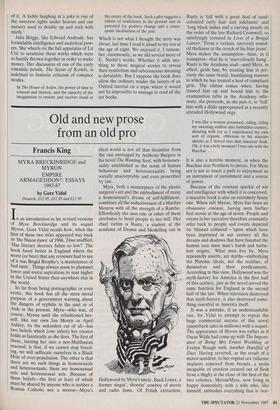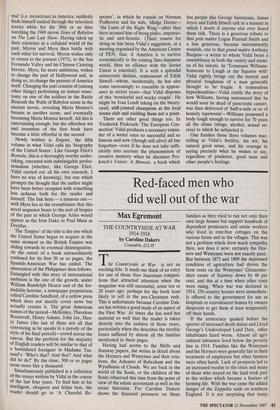Old and new prose from an old pro
Francis King
MYRA BRECKINRIDGE and
MYRON EMPIRE ARMAGEDDON?: ESSAYS 1983-87
by Gore Vidal
Deutsch, £12.95, £11.95 and £11.95
In an introduction to his revised versions of Myra Breckinridge and its sequel Myron, Gore Vidal recalls how, when the first of these two titles appeared way back in 'the Nixon dawn' of 1968, Time snuffled, 'Has literary decency fallen so low?' The book fared better in England where the worst (or best) that any reviewer had to say of it was Brigid Brophy's 'a masterpiece of bad taste'. Things always seem to plummet lower and moral aspirations to soar higher in the United States than anywhere else in the world.
So far from being pornographic or even erotic, this book has all the stern moral Purpose of a government warning about the dangers of syphilis in the past or of Aids in the present. Myra—who was, of course, Myron until she refashioned her- self, like our own Jan Morris or April Ashley, by the unkindest cut of all—has two beliefs which (one infers) her creator holds as fanatically as she does. The first of these, turning her into a neo-Malthusian maenad, is that, if we cannot stop breed- ing, we will suffocate ourselves in a Black Hole of over-population. The other is that there are no such things as homosexuals and heterosexuals; there are homosexual acts and heterosexual acts. Because of these beliefs—the first at least of which must be shared by anyone who is neither a Roman Catholic nor a moron—Myra's ideal world is not all that dissimilar from the one envisaged by Anthony Burgess in his novel The Wanting Seed, with homosex- uality established as the norm of human behaviour and heterosexuality being socially unacceptable and even proscribed by law.
Myra, both a masterpiece of the plastic surgeon's art and the embodiment of many a homosexual's dream of self-fulfilment, combines all the seductiveness of a Marilyn Monroe with all the strength of a Rambo. Effortlessly she uses one or other of these attributes to bend people to her will. Her chief victim is Rusty, a student at the academy of Drama and Modelling run in Hollywood by Myra's uncle, Buck Loner, a former singin', shootin' cowboy of movie and radio fame. Of Polish extraction, Rusty is 'tall with a great deal of sand- coloured curly hair and sideburns' and 'long black lashes and a curving mouth on the order of the late Richard Cromwell, so satisfyingly tortured in Lives of a Bengal Lancer.' From a 'certain, unevenly round- ed thickness at the crotch of his blue jeans', Myra makes the assumption—false, as it transpires—that he is 'marvellously hung'. Rusty is the Academy stud—until Myra, in effect, gelds him, by treating him in pre- cisely the same brutal, humiliating manner in which he has treated a host of compliant girls. The climax comes when, having trussed him up and bound him to the examination table in the Academy infir- mary, she proceeds, as she puts it, to 'ball' him with a dildo appropriated at a recently attended Hollywood orgy.
I was like a woman possessed, riding, riding my sweating stallion into forbidden country, shouting with joy as I experienced my own sort of orgasm, oblivious to his staccato shrieks as I delved into that innocent flesh. Oh, it was a holy moment! I was one with the Bacchae . . .
It is also a terrible moment, as when the Bacchae tear Pentheus to pieces. For Myra sex is not so much a path to enjoyment as an instrument of punishment and a source of power.
Because of the constant sparkle of wit and intelligence with which it is conceived, a macabre book is also an extremely funny one. When still Myron, Myra has been an obssessive cineaste, having seen his/her first movie at the age of seven. People and events in her narrative therefore constantly refer back to people and events depicted on 'blessed celluloid'—`upon which have been imprinted in our century all the dreams and shadows that have haunted the human race since man's harsh and turbu- lent origins.' What men live by, Myra repeatedly asserts, are myths—embodying the Platonic ideals, not the realities, of themselves and their predicaments. According to this view, Hollywood was the myth-factory for America in the first half of this century, just as the novel served the same function for England in the second half of the last. When television destroyed that myth-factory, it also destroyed some- thing essential in America itself.
It was a mistake, if an understandable one, for Vidal to attempt to repeat the huge commercial success of this novel (paperback sales in millions) with a sequel.
The appearance of Myron was rather as if Oscar Wilde had come up with The Import- ance of Being Mrs Ernest Worthing or Evelyn Waugh with Another Handful of Dust. Having reverted, as the result of a motor-accident, to her orginal sex (silicone implants removed from breasts, a penis incapable of erection created out of flesh from a thigh) at the close of the first of the two volumes, Myron/Myra, now living in happy domesticity with a wife who, like himself, embodies everything that is 'nor- mal' (i.e. monstrous) in America, suddenly finds himself sucked through the television screen while for the 30th or so time watching the 1949 movie Siren of Babylon on The Late Late Show. Having taken up their existence in a celluloid world of the past, Myron and Myra then battle with each other for survival. Myron wishes only to return to the present (1973), to the San Fernando Valley and his Chinese Catering Service. Myra, far more ambitious, wishes to change the past of Hollywood and, in doing so, to change the present of America itself. Changing the past consists of (among other things) performing an instant vasec- tomy on one of the soldiers in the Battle Beneath the Walls of Babylon scene in the ancient movie, revealing Maria Montez's breasts in another scene, and eventually becoming Maria Montez herself. All this is entertaining enough; but the effortless wit and invention of the first book have become a little effortful in the second.
Newly written is Empire, the fifth volume in what Vidal calls his 'biography of the United States'. Like George Eliot's Romola, this is a thoroughly worthy under- taking, executed with indefatigable profes- sionalism (whether, like George Eliot, Vidal carried out all his own research, I have no way of knowing), but one which prompts the thought that the author might have been better occupied with something less arduous both for the reader and himself. The link here — a tenuous one — with Myra lies in the resemblance that this novel sequence bears to the sort of biopics of the past in which George Arliss would appear as the Iron Duke or Paul Muni as Dreyfus.
The 'Empire' of the title is the one which the United States began to acquire at the same moment as the British Empire was sliding towards its eventual disintegration. At the outset of a book extraordinarily confused for its first 50 or so pages, the Spanish-American War has ended. The annexation of the Philippines then follows. Entangled with this story of international ambition is the one of the growth, under William Randolph Hearst and of the for- midable heroine, a newspaper proprietress called Caroline Sandford, of a yellow press which does not merely cover news but actually creates it. The great American names of the period—McKinley, Theodore Roosevelt, Henry Adams, John Jay, Hen- ry James (the last of these not all that convincing as he speaks in a parody of the style of his final period)—crowd across the canvas. But the problem for the majority of English readers will be similar to that of a bewildered foreigner in Madame Tus- saud's: 'Who's that? And that? And what did he do?' By the close, 500 or so pages seem more like a thousand.
Simultaneously published is a collection of the essays written by Vidal in the course Of the last four years. To find him at his intelligent, eloquent and feline best, the reader should go to 'A Cheerful Re- sponse', in which he rounds on Norman Podhoretz and his wife, Midge Decter- 'the Lunts of the Right Wing'—after they have accused him of being pinko, unpatrio- tic and anti-Semitic. (Their reason for doing so has been Vidal's suggestion, at a meeting organised by the American Center of PEN, that, if America is to survive economically in the coming Sino-Japanese world, then an alliance with the Soviet Union is essential). It is with a splendid aristocratic disdain, reminiscent of Edith Sitwell—whom, incidentally, he has also come increasingly to resemble in appear- ance in recent years—that Vidal disposes of this 'wonderful and wacky couple'. He might be Ivan Lendl taking on the bleary- eyed, stiff-jointed champions at the local tennis club and yielding them not a point.
There are other good things too. In 'Frederick Prokosch: The European Con- nection' Vidal produces a necessary remin- der of a writer once so successful and so famous and now (though still alive) all but forgotten—even if he does not take suffi- ciently into account the phenomenon of creative memory when he discusses Pro- kosch's Voices: A Memoir, a book which has people like George Santayana, James Joyce and Edith Sitwell talk in a manner in which I doubt if anyone else ever heard them talk. There is a generous tribute to that petit maitre Logan Pearsall Smith and a less generous, because intermittently waspish, one to that grand maitre Anthony Burgess—a writer to whom Vidal bears a resemblence in both the variety and stami- na of his talents. In 'Tennessee Williams: Someone to Laugh at the Squares with' Vidal rightly brings out the mental and physical toughness of a man generally thought to be fragile. A tremendous hypochondriac—Vidal retells the story of how Williams, having announced that he would soon be dead of pancreatic cancer, was then delivered of 'half-a-mile or so of homely tapeworm'—Williams possessed a body tough enough to survive for 70 years all the abuse (drugs, alcohol, sexual ex- cess) to which he subjected it.
One finishes these three volumes mar- velling at Vidal's fertility, his wit, his natural good sense, and his courage in saying precisely what he wishes to say, regardless of prudence, good taste and other people's feelings.



































































 Previous page
Previous page